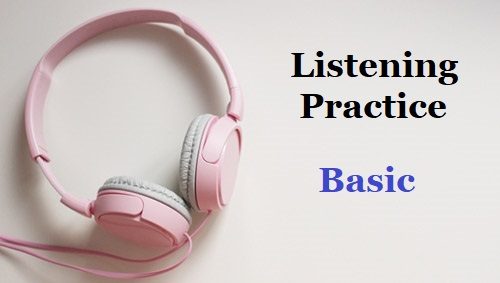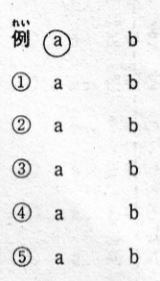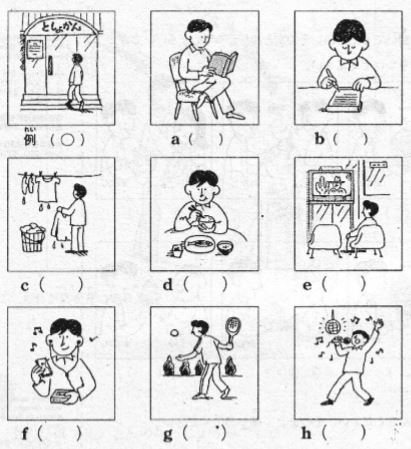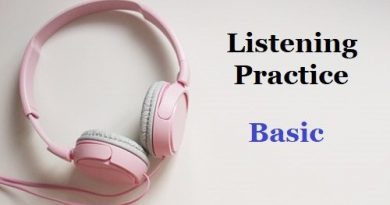Japanese basic listening practice lesson 8
Hello everyone! Today Learn Japanese Daily will introduce to you the Japanese basic listening practice lessons. Let’s start with : Japanese basic listening practice lesson 8

Contents
- 1 Lesson 8 : きのう、何をしましたか。(Kinou, nani wo shimashitaka.) : What did you do yesterday?
- 1.1 1. 例のように正しい答えを選んでください。 Rei no youni tadashii kotae wo erande kudasai. Choose the correct answer to the question as in the example.
- 1.2 2. 短い会話を聞いてください。次に a・b の文を聞いて、会話の内容に合っているものを選んでください。 Mijikai kaiwa wo kiite kudasai. Tsugini a, b no bun o kiite, kaiwa no naiyou ni atte iru mono wo erande kudasai. Listen to the short dialogue. Choose the correct message as in the example.
- 1.3 3. 田中さんはきのう何をしましたか。はじめに絵を見ながら、文を聞いてください。そのあとで会話を聞いて、例のように選んで〇を書いてください。 Tanaka-san wa kinou nani wo shimashitaka. Hajime ni e wo minagara, bun o kiite kudasai. Sono ato de kaiwa o kiite, rei no youni erande 〇 wo kaite kudasai. What did Mr. Tanaka do yesterday? Put 〇 or ✕ in the parentheses as in the example.
- 1.4 4. ひらがなで書いてください。 Hiragana de kaite kudasai. Fill in the blanks using hiragana.
Lesson 8 : きのう、何をしましたか。(Kinou, nani wo shimashitaka.) : What did you do yesterday?
1. 例のように正しい答えを選んでください。
Rei no youni tadashii kotae wo erande kudasai.
Choose the correct answer to the question as in the example.
例:a. みました b. きました (answer : a)
① a. たべました b. よみました
② a. みました b. よみました
③ a. きません b. いきません
④ a. かいました b. あいました
⑤ a. よみませんでした b. のみませんでした
⑥ a. かいました b. かえりました
⑦ a. しません b. きません
⑧ a. しました b. きました
⑨ a. あいませんでした b. ありませんでした
⑩ a. いきます b. います
Script and answer
例
A:きのう、テレビを見ましたか。
B:はい、( ♪ )
A : kinou, terebi wo mimashitaka?
B : hai
A : Did you watch TV yesterday?
B : Yes
①
A:けさ、朝ごはんを食べましたか。
B:はい、( ♪ )
A : kesa, asagohan wo tabemashitaka?
B : hai
A : Did you eat breakfast this morning?
B : Yes
②
A:きのう、新聞を読みましたか。
B:はい、( ♪ )
A : kinou, shinbun wo yomimashitaka?
B : hai
A : Did you read newspaper yesterday?
B : Yes
③
A:あした、銀行へ行きますか。
B:いいえ、( ♪ )
A : ashita, ginkou he ikimasuka?
B : iie
A : Will you go to the bank tomorrow?
B : No
④
A:きのう、本を買いましたか。
B:はい、( ♪ )
A : kinou, hon wo kaimashitaka?
B : hai
A : Did you buy books yesterday?
B : Yes
⑤
A:けさ、コーヒーを飲みましたか。
B:いいえ、( ♪ )
A : kesa, ko-hi- wo nomimashitaka?
B : iie
A : Did you drink coffee this morning?
B : No
⑥
A:きのう、6時に帰りましたか。
B:はい、( ♪ )
A : kinou, roku ji ni kaerimashitaka?
B : hai
A : Did you go home at 6 o’clock yesterday?
B : Yes
⑦
A:今晩、勉強しますか。
B:いいえ、( ♪ )
A : konban, benkyoushimasuka?
B : iie
A : Will you study tonight?
B : No
⑧
A:田中さん、きのう来ましたか。
B:はい、( ♪ )
A : tanaka-san, kinou kimashitaka?
B : hai
A : Did Mr. Tanaka come yesterday?
B : Yes
⑨
A:きのう、田中さんに会いましたか。
B:いいえ、( ♪ )
A : kinou, tanaka-san ni aimashitaka?
B : iie
A : Did you meet Mr. Tanaka yesterday?
B : No
⑩
A:あした、うちにいますか。
B:はい、( ♪ )
A : ashita, uchi ni imasuka?
B : hai
A : Are you at home tomorrow?
B : Yes
Answer
1-a 2-b 3-b 4-a 5-b 6-b 7-a 8-b 9-a 10-b
2. 短い会話を聞いてください。次に a・b の文を聞いて、会話の内容に合っているものを選んでください。
Mijikai kaiwa wo kiite kudasai. Tsugini a, b no bun o kiite, kaiwa no naiyou ni atte iru mono wo erande kudasai.
Listen to the short dialogue. Choose the correct message as in the example.

Script and answer
例
男:リンさん、これから一緒に新宿へ行きませんか。
女:いいですね、行きましょう。
a. 女の人は新宿へ行きます。
b. 女の人は新宿へ行きません。
otoko : Rin-san, korekara isshoni Shinjuku e ikimasenka.
onna : ii desu ne, ikimashou.
a. Onna no hito wa Shinjuku e ikimasu.
b. Onna no hito wa Shinjuku e ikimasen.
Man : Rin, would you like to go to Shinjuku together now?
Woman : Sounds good, let’s go.
a. The woman will go to Shinjuku.
b. The woman won’t go to Shinjuku.
①
男:リンさん、もう昼ごはんを食べましたか。
女:いいえ、まだです。これからです。
a. 女の人は昼ごはんを食べました。
b. 女の人はこれから昼ごはんを食べます。
otoko : Rin-san, mou hiru gohan wo tabemashitaka.
onna : iie, mada desu. Korekara desu
a. Onna no hito wa hiru gohan wo tabemasu.
b. Onna no hito wa korekara hiru gohan wo tabemashita.
Man : Rin, have you had lunch yet?
Woman : Not yet. I’m going to have lunch now.
a. The woman has already had lunch.
b. The woman is going to have lunch now.
②
男:リンさん、デパートで何を買いましたか。
女:何も買いませんでした。
a. 女の人は何か買いました。
b. 女の人は何も買いませんでした。
otoko : Rin-san, depaato de nani wo kaimashitaka.
onna : nani mo kaimasendeshita.
a. Onna no hito wa nani ka kaimashita.
b. Onna no hito wa nani mo kaimasendeshita.
Man : Rin, what did you buy at the department store?
Woman : I didn’t buy anything.
a. The woman bought something.
b. The woman didn’t buy anything.
③
男:アンさんは毎日テレビを見ますか。
女:そうですね。毎日は見ませんが、ときどき見ます。
a. 女の人はときどきテレビを見ます。
b. 女の人はテレビを見ません。
otoko : An-san wa mainichi terebi wo mimasuka.
onna : soudesu ne. Mainichi wa mimasenga, tokidoki mimasu.
a. Onna no hito wa tokidoki terebi wo mimasu.
b. Onna no hito wa terebi wo mimasen.
Man : An, do you watch TV every day?
Woman : I don’t watch TV every day but sometimes.
a. The woman sometimes watches TV.
b. The woman doesn’t watch TV.
④
男:アンさん、ちょっと休みましょう。コーヒーを飲みませんか。
女:ありがとう。でも、わたしはコーヒーは飲みません。水をください。
a. 女の人はコーヒーを飲みます。
b. 女の人はコーヒーを飲みません。
otoko : An-san, chotto yasumimashou. Koohii wo nomimasenka?
onna : arigatou. Demo, watashi wa koohii wa nomimasen. Mizu wo kudasai.
a. Onna no hito wa koohii wo nomimasu.
b. Onna no hito wa koohii wo nomimasen.
Man : An, let’s take a rest for a while. Would you like some coffee?
Woman : Thank you. But I don’t drink coffee. Can I have some water?
a. The woman will drink coffee.
b. The woman won’t drink coffee.
⑤
男:アンさんは1日にどのくらい日本語を勉強しますか。
女:そうですね。3時間ぐらいです。
a. 女の人は1日に3回ぐらい勉強します。
b. 女の人は1日に3時間ぐらい勉強します。
otoko : An-san wa ichinichi ni dono kurai Nihongo wo benkyou shimasuka.
onna : soudesu ne. Sanjikan gurai desu.
a. Onna no hito wa ichinichi ni sankai gurai benkyou shimasu.
b. Onna no hito wa ichinichi ni sanjikan gurai benkyou shimasu.
Man : An, how long do you study Japanese for a day?
Woman : Let me see. About 3 hours.
a. The woman studies about three times a day.
b. The woman studies about 3 hours a day.
Answer
1-b 2-b 3-a 4-b 5-b
3. 田中さんはきのう何をしましたか。はじめに絵を見ながら、文を聞いてください。そのあとで会話を聞いて、例のように選んで〇を書いてください。
Tanaka-san wa kinou nani wo shimashitaka. Hajime ni e wo minagara, bun o kiite kudasai. Sono ato de kaiwa o kiite, rei no youni erande 〇 wo kaite kudasai.
What did Mr. Tanaka do yesterday? Put 〇 or ✕ in the parentheses as in the example.

Script and answer
例 図書館へ行きました。
Toshokan e ikimashita.
He went to the library.
a. 本を読みました。
Hon wo yomimashita.
He read books.
b. レポートを書きました。
Repooto wo kakimashita.
He wrote a report .
c. 洗濯をしました。
Sentaku wo shimashita.
He did the laundry.
d. ごはんを食べました。
Gohan wo tabemashita.
He ate.
e. ビデオを見ました。
Bideo wo mimashita.
He watched video.
f. テープを聞きました。
Teepu wo kikimashita.
He listened to the tape.
g. テニスをしました。
Tenisu wo shimashita.
He played tennis.
h. 歌を歌いました。
Uta wo utaimashita.
He sang.
会話を聞いてください。
A:田中さん、きのう部屋にいませんでしたね。
A : Tanaka-san, kinou heya ni imasendeshita ne.
A : Tanaka, you weren’t in your room yesterday, right?
B:ええ、きのうは図書館に行きました。
B : ee, kinou wa toshokan ni ikimashita.
B : Yeah, I went to the library yesterday.
A:勉強ですか。まじめですねえ。
A : benkyou desuka. Majime desu nee.
A : Did you study? You are earnest.
B:いや、図書館で映画のビデオを見ました。
B : iya, toshokan de eiga no bideo wo mimashita.
B : No, I watched movie video at the library.
A:え、ビデオ?
A : e, bideo?
A : Huh, video?
B:ええ、映画のビデオです。あの図書館にはおもしろいビデオがたくさんありますよ。
B : ee, eiga no bideo desu. Ano toshokan ni wa omoshiroi bideo ga takusan arimasu yo.
B : Yes, movie video. There are many interesting videos at that library.
A:へえ、そうですか。
A : hee, soudesuka.
A : Really?
B:図書館の食堂で昼ごはんも食べました。それから、またビデオを見ました。
B : toshokan no shokudou de hiru gohan mo tabemashita. Sorekara, mata bideo wo mimashita.
B : I also had lunch at the cafeteria in the library. And then I watched video again.
A:へえ。夜も部屋にいませんでしたね。
A : hee. Yoru mo heya ni imasendeshita ne.
A : Really? You weren’t in your room last night either.
B:ええ、友達とカラオケに行きました。いろいろな歌をたくさん歌いました。楽しかったなあ。
B : ee, tomodachi to karaoke ni ikimashita. Iroiro na uta wo takusan utaimashita. Tanoshikatta naa.
B : Yeah, I went to karaoke with my friends. We sang a lot of songs. That was so fun.
A:ええ。あしたは試験がありますよ。だいじょうぶ?
A : ee. Ashita wa shiken ga arimasu yo. Daijoubu?
A : What? There is a test tomorrow. Is it okay?
Answer
d, e, h
4. ひらがなで書いてください。
Hiragana de kaite kudasai.
Fill in the blanks using hiragana.
わたしは、まいあさ7時に( )。そして、あさごはんを( )。8時にがっこうへ( )。じゅぎょうは9時半から3時までです。わたしのせんせいは( )せんせいです。4時にうちへ( )。まいにち、しゅくだいが( )。うちで3時間( )。それから、テレビを( )。ときどき、家族に手紙を( )。12 時に( )。
Script and answer
わたしは、毎朝7時に(おきます)。そして、朝ごはんを(たべます)。8時に学校へ(いきます)。授業は9時半から3時までです。わたしの先生は(しんせつな)先生です。4時にうちへ(かえります)。毎日、宿題が(あります)。うちで3時間(べんきょうします)。それから、テレビを(みます)。ときどき、家族に手紙を(かきます)。12 時に(ねます)。
Watashi wa, maiasa shichiji ni okimasu. Soshite, asa gohan wo tabemasu. Hachiji ni gakkou e ikimasu. Jugyou wa kujihan kara sanji made desu. Watashi no sensei wa shinsetsuna sensei desu. Yoji ni uchi e kaerimasu. Mainichi, shukudai ga arimasu. Uchi de sanjikan benkyou shimasu. Sorekara, terebi o mimasu. Tokidoki, kazoku ni tegami wo kakimasu. Juuniji ni nemasu.
I get up at 7 o’clock every morning. Then I have breakfast. I go to school at 8 o’clock. The class starts at 9:30 and finishes at 3:00. My teacher is kind. I go home at 4 o’clock. Every day, I have homework to do. At home, I spend 3 hours studying. Then I watch TV. Sometimes I write a letter to my family. I go to bed at 12 o’clock.
Above is : Japanese basic listening practice lesson 8. See other similar lessons at category : Japanese listening practice or Japanese basic listening practice
